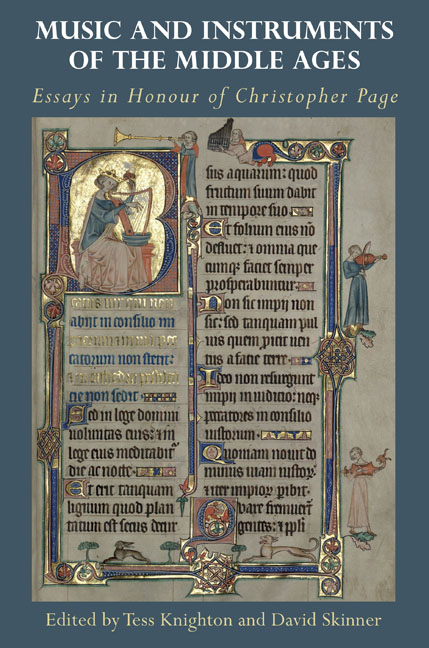Book contents
- Frontmatter
- Contents
- List of Illustrations
- List of Music Examples
- List of Tables
- List of Contributors
- List of Music Manuscript Sigla
- Acknowledgements
- Introduction
- SONGSTERS AND THEIR REPERTORIES
- CLOSE READINGS
- CREATING POLYPHONY
- MUSIC AS CULTURAL PRACTICE
- Works Cited
- Works by Christopher Page
- Index
- Tabula Gratulatoria
- Studies in Medieval and Renaissance Music
10 - ‘The spirit moves me to speak of forms changed into new bodies’: Anton Webern, Philippe de Vitry, and the Reception of the Ars Nova Motet
Published online by Cambridge University Press: 24 November 2020
- Frontmatter
- Contents
- List of Illustrations
- List of Music Examples
- List of Tables
- List of Contributors
- List of Music Manuscript Sigla
- Acknowledgements
- Introduction
- SONGSTERS AND THEIR REPERTORIES
- CLOSE READINGS
- CREATING POLYPHONY
- MUSIC AS CULTURAL PRACTICE
- Works Cited
- Works by Christopher Page
- Index
- Tabula Gratulatoria
- Studies in Medieval and Renaissance Music
Summary
If you want to create a work of art that is unified in its mood and consistent in its structure … [then] this is only possible through the inspiration by a poetical idea, whether or not it be introduced as a programme. I consider it a legitimate artistic method to create a correspondingly new form for every new subject. … Of course, purely formalistic, Hanslickian music-making will no longer be possible, and we cannot have any more random patterns, that mean nothing either to the composer or the listener.
It is possible that some motet composers were drawn to a hyperbolized and even transcendentalized conception of the materials of composition; such attitudes have been too common among the composers of the twentieth century for us to deny them to those of the fourteenth.
Many contend that the reception of medieval music in modern times says more about the society remaking the Middle Ages in its own image than it does about the Middle Ages. The revival of interest in medieval music since the eighteenth century, though entertaining as a story, is, one might argue, irrelevant to any current attempt to come to grips with the function, social context, and compositional history of this music in its own time. But that is what I am going to attempt here. I want to take useful historical analogies – of any vintage – and use them to reveal some unexpected things, not about the present, but about the past.
Nineteenth-century editors took Machaut's hybrid narrative Voir dit literally, as a love story, a fact we may either decry or find amusing, but Machaut himself anticipated this reception. As Deborah McGrady has shown, the courtly public he depicted in the poem received his ongoing project literally as well. Regardless of the range of motivations that may have guided the poet's creation, he knew, for better or for worse, that his courtly consumers prized the story's entertainment value above all, and so it should not astonish us that the exact same interpretation resonated when the work re-emerged in the nineteenth century. In spite of the superiority we feel as regards scholarly matters, the nineteenth-century reception actually remains a valid facet of the work.
- Type
- Chapter
- Information
- Music and Instruments of the Middle AgesEssays in Honour of Christopher Page, pp. 271 - 304Publisher: Boydell & BrewerPrint publication year: 2020
- 1
- Cited by

